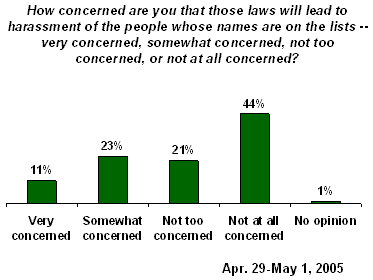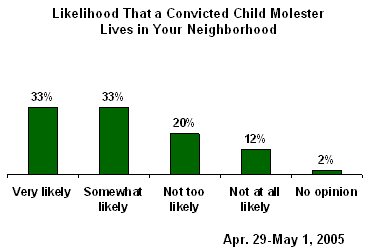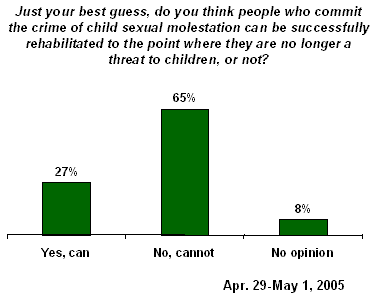GALLUP NEWS SERVICE
PRINCETON, NJ -- The February rape and murder of 9-year-old Jessica Lunsford in Florida by a convicted sex offender helped spur U.S. Attorney General Alberto Gonzales to recently announce plans to put a National Sex Offender Registry on the Internet this summer. But as some recent Gallup polling suggests, the key to whether the new registry is effective at reducing child sex crimes could be the amount of effort that goes into publicizing its existence.
Even now, virtually all Americans have access to state records indicating whether convicted sex offenders are living in their local communities, but according to a recent CNN/USA Today/Gallup poll, only 38% of Americans think their state maintains such a resource. As a result, only about one-quarter of Americans have checked these lists. The rate is slightly higher among parents of minor children, but only 36% of these people have checked the available registries.
The 1996 federal Megan's Law -- so-named after 7-year-old Megan Kanka, who was raped and murdered by a neighboring sex offender -- requires all states to maintain an updated registry of sex offenders once they are released into the community. The law also compels states to make this information available to the public, with some latitude concerning how this "notification" component is implemented.
The merits of publicizing this information are virtually undisputed by the public at large. An April 29 - May 1, 2005, Gallup survey finds 94% of Americans in favor, and only 5% opposed, to laws requiring registration of people convicted of child molestation.
Also, there is relatively little sympathy for the argument that such laws will lead to harassment of people named on these registry lists. Only one-third of Americans are very or somewhat concerned about this; 44% are not at all concerned, while another 21% are not too concerned.

Rather, most Americans see the need for public access to information about where sex offenders are living:
- Two-thirds of Americans presume that someone convicted of child molestation probably lives in their neighborhood: 66% think this is very or somewhat likely and only 12% think it is not at all likely.

- Sixty-five percent of Americans believe that child molesters cannot, generally, be rehabilitated.

- Seventy-seven percent say that people who sexually molest children are less likely than other types of serious criminals to be successfully rehabilitated.
What Registry?
Despite all of the national publicity about Megan's Law since its passage in 1996, and despite the fact that, according to a May 2005 speech by Gonzales, 48 states provide Internet-based access to these lists, a majority of Americans are uncertain about whether a publicly available list of sex offenders is maintained in their area. Only 38% say that such a list is maintained, while 4% say it is not maintained and 58% are unsure.
The percentage of Americans who have ever checked a sex offender list is even smaller. Just 23% of U.S. adults have done this, including 36% of adults who are parents of children under the age of 18.
Men and women are about equally likely to have checked such a list, but the rate of checking is slightly higher in urban areas than it is in rural areas (26% to 18%, respectively). Also, residents in the East are less likely to have checked than are those living in other regions of the country.
More limited access to the Internet could be dampening the ability of people from lower income households to review their local registry, but even those in higher income households exhibit a low rate of checking.
|
Percent Who Have Checked Their Local Sex Offender Registry |
|
|
|
|
|
% |
|
|
Men |
25 |
|
Women |
21 |
|
|
|
|
Urban |
26 |
|
Suburban |
23 |
|
Rural |
18 |
|
|
|
|
East |
15 |
|
Midwest |
26 |
|
South |
24 |
|
West |
27 |
|
|
|
|
$75,000 or more in household income |
33 |
|
$50,000 - $74,999 |
31 |
|
$30,000 - 49,999 |
19 |
|
Less than $30,000 |
12 |
|
|
|
|
Parents of children under 18 years of age |
36 |
|
No children under 18 years of age |
16 |
Americans' perceptions about the likelihood that a convicted child molester lives in their neighborhood also has relatively little bearing on whether or not people look up their locale on a sex offender registry. Even those who think it is "very likely" that a child molester lives in their neighborhood are unlikely to have ever checked (only 37% have). The rate is 18% among those who think the chances a child molester lives in the neighborhood are "somewhat likely," 13% among those who say "not too likely" and 23% among those who say "not at all likely."
What does matter is awareness of the existence of state registries. Six in 10 respondents (61%) who believe their state does maintain a registry say they have checked it.
That most Americans are unaware that their state provides this service suggests that a national registry -- combined with a national public awareness campaign to raise awareness of the registry and how to access it -- could be what is needed to make Megan's Law more effective.
Survey Methods
These results are based on telephone interviews with a randomly selected national sample of 1,006 adults, aged 18 and older, conducted April 29-May 1, 2005. For results based on this sample, one can say with 95% confidence that the maximum error attributable to sampling and other random effects is ±3 percentage points. For results based on the 492 national adults in the Form A half-sample and 514 national adults in the Form B half-sample, the maximum margins of sampling error are ±5 percentage points. For results based on the sample of 381 adults who say they live in an area that maintains a registry of child sex offenders, the maximum margin of sampling error is ±6 percentage points.
In addition to sampling error, question wording and practical difficulties in conducting surveys can introduce error or bias into the findings of public opinion polls.
44. As you may know, many states have laws that require people convicted of child molestation who have been released from prison to register with the police when they move to a new home and to report any change in their address. In addition, their names and addresses are made available to the public. Do you favor or oppose such laws?
|
Favor |
Oppose |
No opinion |
|
|
|
|
|
|
|
2005 Apr 29-May 1 |
94% |
5 |
1 |
45. How concerned are you that those laws will lead to harassment of the people whose names are on the lists -- very concerned, somewhat concerned, not too concerned, or not at all concerned?
|
Very |
Somewhat |
Not too |
Not at all |
No |
|
|
2005 Apr 29-May 1 |
11% |
23 |
21 |
44 |
1 |
46. How likely do you think it is that someone who has been convicted of the crime of child molestation is currently living in your neighborhood -- very likely, somewhat likely, not too likely, or not at all likely?
|
Very |
Somewhat |
Not too |
Not at all |
No |
|
|
2005 Apr 29-May 1 |
33% |
33 |
20 |
12 |
2 |
47. Thinking about the situation in your local community, do the police or other authorities maintain a publicly available list of child sex offenders living in your area, do they not maintain a list, or are you unsure?
|
|
|
Do not |
|
No |
|
|
|
|
|
|
|
2005 Apr 29-May 1 |
38% |
4 |
58 |
-- |
48. Have you, personally, ever checked the list, or not?
BASED ON 381 ADULTS WHO SAY THEY LIVE IN AN AREA THAT MAINTAINS A REGISTRY OF CHILD SEX OFFENDERS
|
|
Yes |
No |
No opinion |
|
|
|
|
|
|
2005 Apr 29-May 1 |
61% |
39 |
-- |
COMBINED RESPONSES (Q.47-48)
|
|
2005 Apr 29-May 1 |
|
|
% |
||
|
Maintains a list |
38 |
|
|
(Respondent has checked the list) |
(23) |
|
|
(Respondent has not checked the list) |
(15) |
|
|
|
||
|
Does not maintain a list |
4 |
|
|
Unsure |
58 |
|
|
No answer |
-- |
|
49. Just your best guess, do you think people who commit the crime of child sexual molestation can be successfully rehabilitated to the point where they are no longer a threat to children, or not?
BASED ON 492 NATIONAL ADULTS IN FORM A
|
|
Yes, can |
No, cannot |
No opinion |
|
|
|
|
|
|
2005 Apr 29-May 1 |
27% |
65 |
8 |
50. Just your best guess, do you think people who commit the crime of child sexual molestation do so because of a mental illness, or not?
BASED ON 514 NATIONAL ADULTS IN FORM B
|
|
Yes, illness |
No, not |
No opinion |
|
|
|
|
|
|
2005 Apr 29-May 1 |
42% |
53 |
5 |
51. Just your best guess, do you think people who commit the crime of child sexual molestation are more likely or less likely to be successfully rehabilitated than people who commit other serious crimes?
BASED ON 492 NATIONAL ADULTS IN FORM A
|
|
More likely |
Less likely |
SAME (vol.) |
No opinion |
|
|
|
|
|
|
|
2005 Apr 29-May 1 |
8% |
77 |
7 |
7 |
|
(vol.) = Volunteered response |
||||